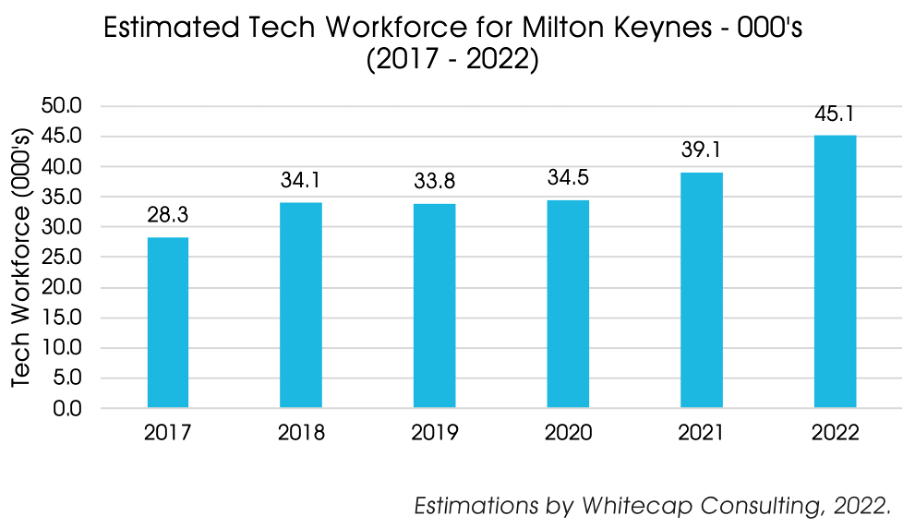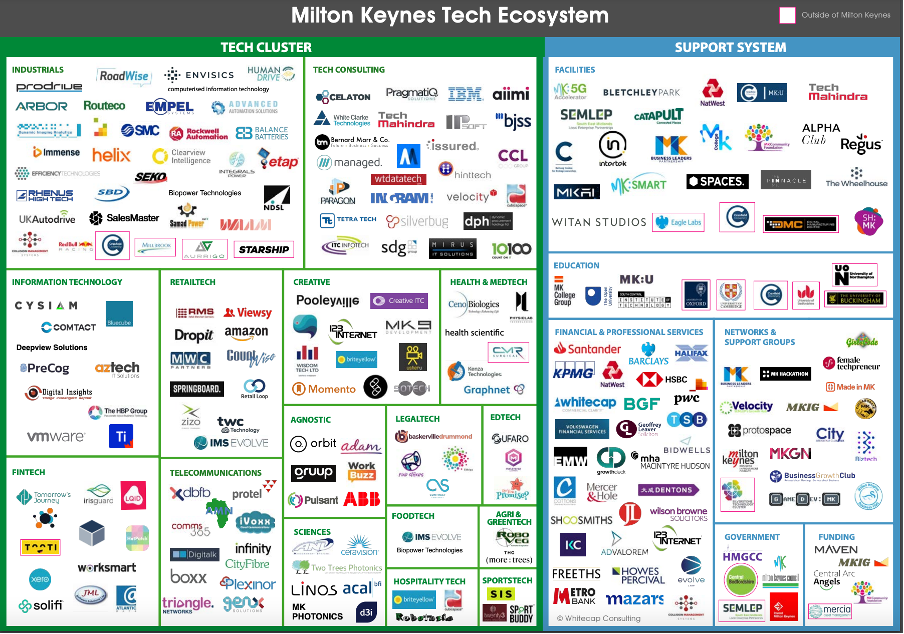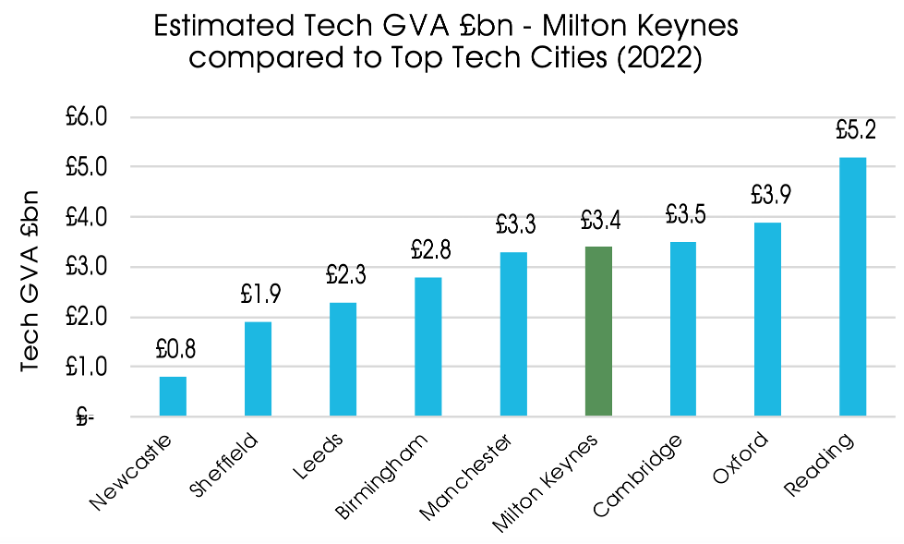In this article, Chloe Thompson, Consultant at Whitecap Consulting examines the strong and thriving tech sector that exists within Milton Keynes, highlighting the high proportion of tech activity when compared to other UK cities and discussing some of the key strengths and capabilities that exist across the city.

Milton Keynes has a high proportion of tech activity when compared to other UK cities.
Milton Keynes has a substantial tech sector with a high proportion of tech activity. The sector comprises of an estimated 2400 tech related businesses and an estimated tech workforce of 45,000, making up for 18% of all businesses in Milton Keynes and 30% of the total workforce.

The image below visually demonstrates the breadth of tech that exists across the Milton Keynes Ecosystem.

Milton Keynes has an estimated tech GVA of £3.4bn (2022).
A further indication of the strength of the tech sector in Milton Keynes is the estimated Tech GVA, (estimations have been made by Whitecap Consulting and calculated using GVA data published by ONS – see methodology section in the report for a detailed breakdown of formulas/calculations), valued at c.£3.4bn for 2022. This is higher than some of the UK’s largest cities such as Birmingham, Leeds and Manchester which have an estimated Tech GVA of £2.8bn, £2.3bn and £3.3bn respectively.

Milton Keynes has particular strengths/capabilities in Autonomous & Driverless Vehicles, Robotics and 5G.
Although Milton Keynes has a wide breadth of tech activity that exists across the city, the research did reveal three particular strengths that are visible and present key opportunities for the future growth of the tech sector.
Autonomous Vehicles
With the largest fleet in the world and four years on from the release of Starships delivery robots, Milton Keynes has become accustomed to seeing Autonomous Vehicles driving around the city and making deliveries.
Starship robots are advanced autonomous devices with 360 vision which allows them to carry items over short distances whilst safely navigating around pedestrians and other obstacles. Parcels, groceries, food and drink can be directly delivered from stores to customers via a mobile app with the robot’s entire journey and live location being monitored and tracked. For security, the cargo bay is mechanically locked throughout the journey and can be opened only by the recipient with their smartphone app.
As an electronically powered robot, the service is offering a cleaner, faster and more cost-efficient way to make deliveries. The Milton Keynes operation was the first commercial deployment in the UK with residents being able to download the Starship Deliveries App and order items to be delivered to their door via the autonomous robots. This was particularly useful throughout the Covid-19 pandemic as the multiple lockdowns caused an increased strain on the gig economy delivery drivers.
Driverless Vehicles
A major trial of driverless vehicles on public roads has been taking place in Milton Keynes earlier this year.
The Fetch car system trial is operated by Imperium Drive, an innovative start-up which took part in The MK:5G Accelerator, a programme delivered by Connected Places Catapult and True Altitude. The trial, backed by Milton Keynes City Council, enables users to order a car via an app, which is then driven by a remote driver to their location. The customer then drives the car to their desired location, from where a remote vehicle operator takes over and pilots the car back to base or to the next user.
The aim of the Fetch trial is to eliminate some of the challenges with public transport such as cost and inconvenience, with the CEO of Imperium Drive stating, “our goal is to make on-demand door-to-door transport more cost-effective and convenient than every alternative, even privately owned cars.” Remote driving technology is already being trialled in other countries, but Fetch is the first application in the UK. The trial features a variety of car types including standard saloon cars to electric microcars. The technology uses 5G connectivity which enables remote operators to switch between controlling different cars when required.
5G (Fifth Generation)
A third strength of Milton Keynes includes the investment into 5G connectivity, resulting in a private, standalone 5G network across the city.
The MK:5G initiative, led by the council and funded by a consortium, has facilitated the deployment of a 5G infrastructure designed exclusively to support research and development in the context of the Smart City agenda in Milton Keynes. 5G, the fifth generation of wireless technology, can provide higher speed, lower latency and greater capacity than 4G Long Term Evolution (LTE) networks, resulting in more efficient businesses and giving consumers access to more information faster than ever before. 5G speed and its connectivity benefits are expected to have a number of practical applications such as:
- High speed mobile network which will revolutionise the mobile experience.
- Internet of Things – connecting every object, appliance, sensor, device, and application to the Internet.
- Reliable, low-latency autonomous vehicles with real-time communication and data sharing viability.
- Smart City functionality including traffic management, instant weather updates, energy management, smart power grid, smart street lighting of the street, water resource management, emergency response and more.
The 5G network across Milton Keynes will not only improve the running of businesses but the implications for accessibility, the reach of mobile broadband and the improvements in society’s safety, health and security have the potential to be much farther reaching.
In summary, Milton Keynes has a strong and thriving tech sector, demonstrated by both the contribution of tech to the overall GVA as well as the high proportion and breadth of tech activity that exists across the city. When compared to other UK cities, Milton Keynes fairs extremely well with a higher tech GVA than Birmingham Manchester and Leeds, raising the question as to why Milton Keynes is not more established on the national and international map. Steps are taken to address such questions within the recommendations of the report, specifically looking at how Milton Keynes can raise the profile of the tech sector, attracting more talent and skills and investment opportunities. To explore the key findings of the report as well as the recommendations in more detail, please download the full report which can be accessed via the link below.
Download Report Here
Report Background
The research has drawn together data and insight from across the tech sector in Milton Keynes, combining inputs from interviews with over 40 stakeholders, desk research including analysis of economic data and an open online survey. The report analyses the strengths and capabilities of the tech sector whilst highlighting some of the challenges and opportunities for future growth.
The report also provides six recommendations for Milton Keynes to support the development of the tech sector and to help establish it on the national and international map.
The research has been supported by Mazars, Milton Keynes College/ South Central Institute of Technology, Milton Keynes City Council, Protospace, Santander, The Open University and University of Buckingham.